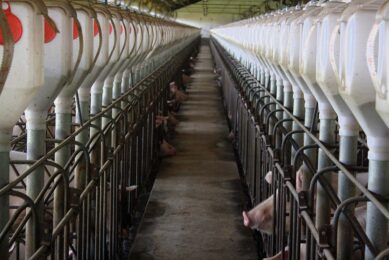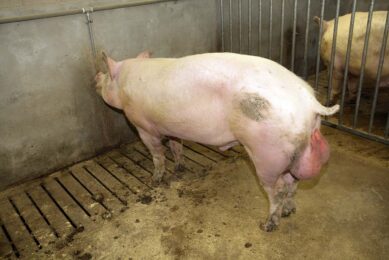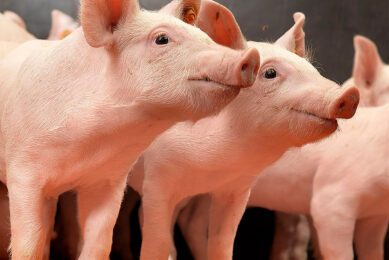Interview: Integrating computer vision with pig welfare

Professor Michael T. Mendl has been interested in animals and animal behaviour since he was a child. Now he is a professor at Bristol Veterinary School in the UK and has delved into the question of how computer vision can help identify pig behaviour.
During another year of his cutting-edge research, Prof Michael T. Mendl will present a talk at the 2022 edition of the International Pig Veterinary Society (IPVS) congress in Rio de Janeiro in June. He will discuss the challenges of attempting to measure animal affective states and welfare under field conditions, with a specific focus on the development of computer vision methods for assessing startle and freeze behaviour in domestic pigs.
Prof Mendl reflects on his research so far, how animal welfare has changed, and what’s ahead in his chosen field.
What attracted you to the field of animal welfare? Was it in childhood or later on?
Prof Michael Mendl: “I can remember being interested in animals and animal behaviour from a very young age. When I went to the University of Cambridge to study natural sciences, I was surprised to find that people actually did scientific research into animal behaviour, so I ended up selecting courses in the area and was lucky enough to enrol for a PhD with Professor Patrick Bateson at Cambridge University, studying behavioural development.
“Following this, I moved to Groningen University in the Netherlands to continue fundamental studies of behavioural development. During my time there, my partner, Dr Liz Paul, and I had many discussions about the direction and potential applications of animal behaviour research, including how it might benefit animals themselves. This made me switch tack to apply for positions that used animal behaviour in the context of animal welfare. Very conveniently, a postdoc studying the behaviour and welfare of domestic pigs came up with Professor Donald Broom back in Cambridge, and I was appointed to that and started research in animal welfare.”
How has the field of farm animal welfare changed in your view since you started studying it?
“I think many of the broad challenges of animal welfare research are still similar to when I joined the field. How can one measure animal welfare scientifically, and what is animal welfare exactly? How do different ways of keeping animals influence their welfare? How can housing and husbandry be altered to improve animal welfare? And so on.
“However, there have been notable changes in the last decade or 2, including an increased focus on animal emotional (affective) states as key determinants of welfare. To many, though not all, welfare is all about ensuring that captive animals are kept in ways which enhance positive affective states and minimise negative ones. This brings with it the challenges of how to assess these mental states scientifically and whether and how we might infer the conscious experiences of other animals.”
What are some of the other changes in the field?
“There have been big advances in trying to identify the most relevant welfare problems and implement the findings of animal welfare research by working more closely with farmers and other stakeholders and bringing social science methods to bear on the issues.
“And recently, there has been growing interest in the use of automation and precision-livestock farming methods to monitor and detect welfare problems. Progress in this latter exciting area needs to proceed mindful of the importance of maintaining human contact with our managed animals.
“Finally, there is increasing interest in how animal welfare fits into the concept of sustainable agriculture, and how sustainability-related changes can be implemented without imposing a welfare cost.”
Progress has been made in developing approaches to assessing animal emotion
What specific questions do you feel you have personally answered about animal welfare during your career?
“I guess one contribution that Dr Liz Paul and I have made, with others, is to bring the study of animal emotion to the fore in animal welfare science and to develop novel approaches to assessing animal affective states. We have focused on the measurement of changes in cognition and decision-making as proxy markers of affective state, in particular the idea that (cognitive) biases in decision-making may be closely related to whether the animal is in a positive or negative affective state and hence whether its welfare is relatively good or poor respectively. I am not sure that we have answered questions in this area as opposed to raising new ones (!), but certainly progress has been made in developing approaches to assessing animal emotion.”
How has your research focus changed over time and, if so, why?
“My research has shifted from an early focus on behavioural development, individual differences and social behaviour to a focus on cognitive and affective processes in animals, mainly due to the natural path that research interests take due to encounters with other scientists, moves to different institutes, the general zeitgeist and the development of new methods.
“For example, we are currently collaborating with psychologists and computational neuroscientists to use computational modelling methods to better understand the relationship between affective states and decision-making. However, I continue to retain an interest in individual differences in, for example, affective state, coping and resilience.”
What would you like to find out in the next five or ten years?
“I am interested in the concept of resilience, how an animal’s cognitive and affective style feeds into that, and how one might enhance resilience by capitalising on this knowledge. I would also love to do work on animal consciousness – a hugely challenging area – as ultimately if we are concerned about animal welfare because we are concerned about how animals feel, then we need to be able to infer these feelings as accurately as possible, including in invertebrate taxa where there remains controversy over whether and what individuals may be able to experience.”
The drive for sustainability in agriculture is to be welcomed, but one way forward is to enhance efficiency
What are your current thoughts about animal welfare for production animals?
“I think that farm animal welfare needs to remain a high priority. There are still lots of problems to be addressed including, unfortunately, many that have been around for a long time: intensive housing of pigs (particularly growing and fattening pigs) and related problems like tail-biting and aggression between newly mixed sows; feather-pecking in laying hens; leg problems in broilers; lameness and mastitis in dairy cattle, among others.”
How do you see actual animal welfare meshing with sustainability concerns and other factors?
“The drive for sustainability in agriculture is to be welcomed, but one way forward is to enhance efficiency. This might include reverting to more intensive production systems with welfare consequences for the animals involved. So, in the coming years there may be renewed threats to animal welfare from travel in this direction. I think this area needs much more research to ensure that animal welfare is not left behind in any drive to enhance efficiency. Animal welfare still remains a societally important ‘good’ that should factor into any sustainability equation, and consumers will continue to value it as an important consideration in any new developments in animal production systems.
“Of course, this will differ across cultures and in communities of varying affluence, but I do not think it will go away and will likely become an area of increasing concern if society’s reliance on meat products decreases as part of sustainability strategies and in response to changes in eating habits.”
At the congress, what do you want participants to take away from your presentation?
“It’s known from studies of humans and rodents that how strongly one startles to an unexpected sound appears to be related to one’s background emotional state – for example, anxious or fearful people show stronger startle responses.
“Since pigs show a very clear ‘startle and freeze’ response when unexpectedly disturbed, we sought to develop methods of stimulating and measuring these that could be used under field conditions, and to validate whether startle is related to affective state in pigs as it appears to be in humans and rodents.
“I think my talk will illustrate that we can use computer vision to measure these responses – hence opening the way for assessing them using video on-farm – but that the dream of having a simple on-farm metric for affective state is not that easy to achieve.”
 Beheer
Beheer








 WP Admin
WP Admin  Bewerk bericht
Bewerk bericht